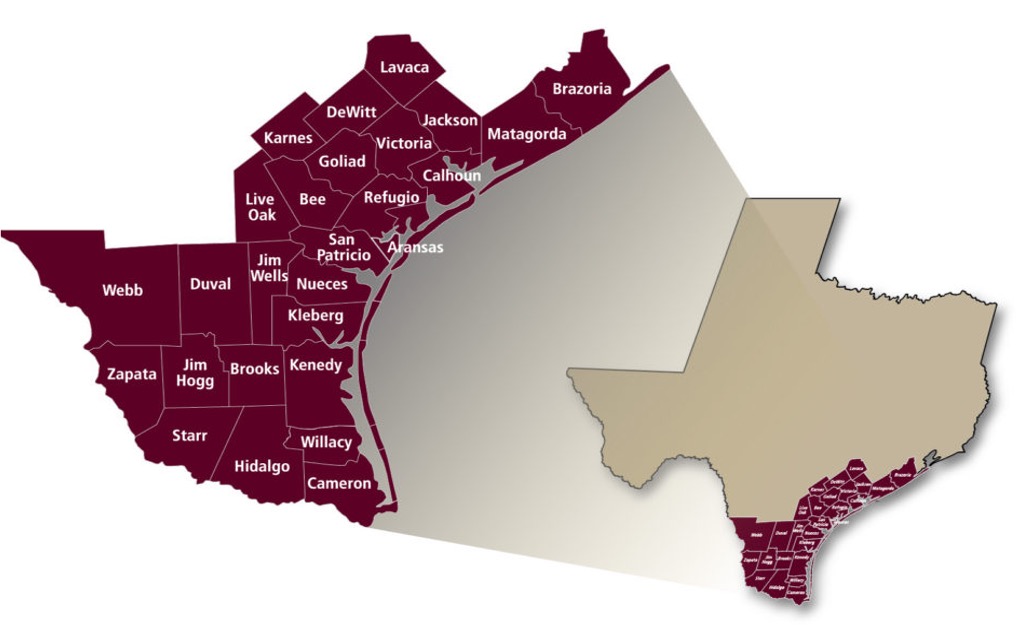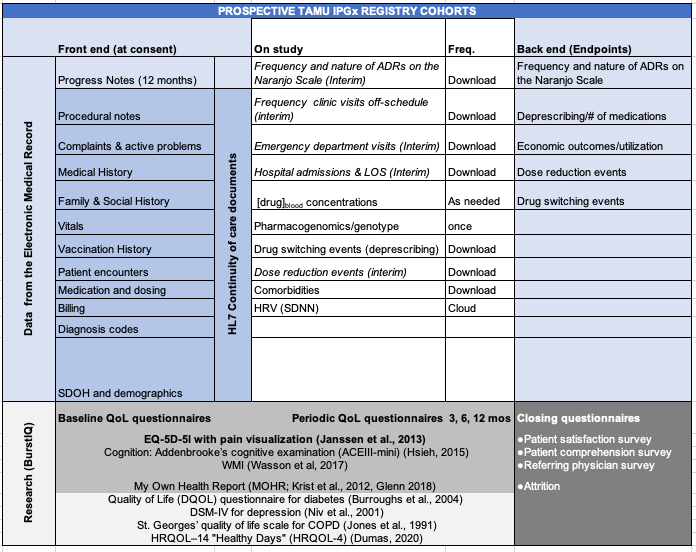Clinicogenomics Populations
Populations | Programs | Registries
- Brazos Valley Family Medicine Catchment
- TREC@TAMU Cancer Prevention Registry
- Healthy South Texas Medication Assistance Program
- Community Pharmacy
- Interprofessional Pharmacogenomic (IPGx) Registry
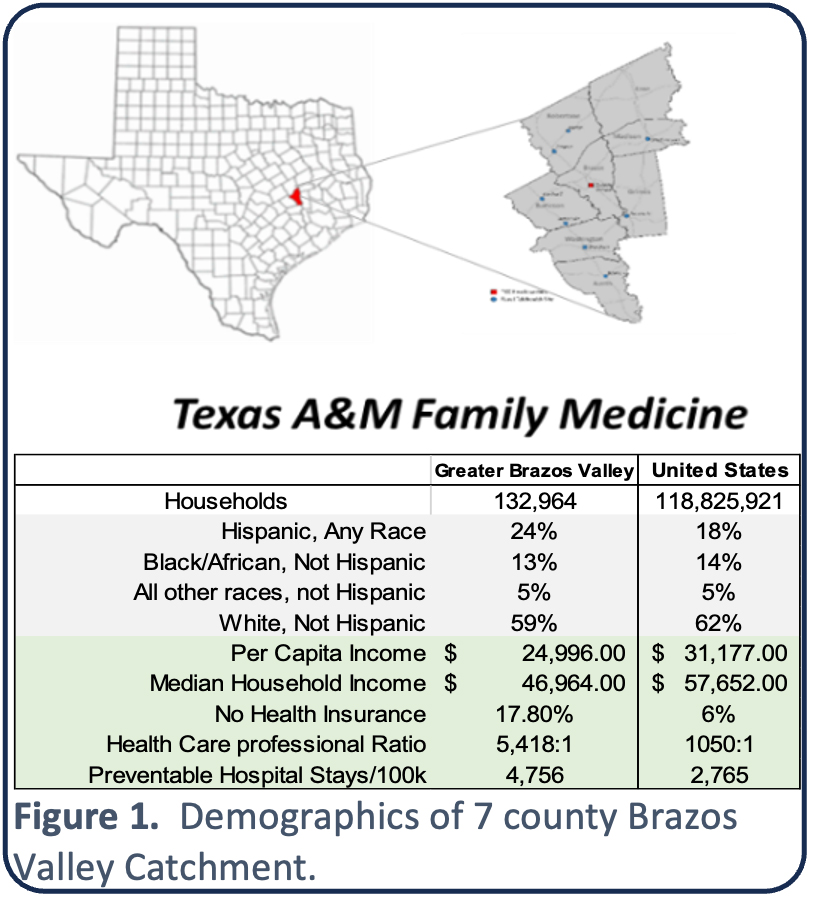 |
Brazos Valley Family Medicine CatchmentThere are over 1000 polypharmacy patients (current focus of IPGx), (n> 35,000 patients in the Texas A&M Health System). This population closely resembles the US population demographically (Figure 1). These patients are predominantly rural college students or university employees; 16 physician faculty, 30 residents, 1 family medicine nurse practitioner (FNP), 1 behavioral health faculty member, and 1 clinical pharmacy specialist. This population utilized telemedicine services, and remote serial sampling for clinical PK and MTM using Neoteryx microsampling is under consideration. |
TREC@TAMU Cancer Prevention Registry
A grant from the Cancer Prevention Research Institute of Texas, CPRIT, funds the program. Documentation of the genetic, environmental, and lifestyle dimensions is crucial to validating and implementing cancer prevention and treatment strategies. This is often a critical unmet need at academic health centers, which limits the ability of cancer investigators to access biospecimens and complete in silico investigations across time, geography, and healthcare organizations along the patient journey (especially before a cancer diagnosis). The service was modeled after the Interprofessional Pharmacogenomics Clinic (IPGx) Registry launched to study pharmacogenomic interventions in the Health Hub and Family Medicine clinics of Texas A&M Health. 4, 5
In most academic medical centers and cancer center settings, where most robust clinicogenomic registries reside, the genetics of premalignant lesions (i.e., liquid biopsy material from blood) and the natural progression of disease are often unavailable.
In addition, the study of social and environmental factors intertwined with genetics is limited because biospecimens are collected after a cancer diagnosis, and retrospective analysis of health records is limited to data obtained within the oncology ecosystem. As such, typical registries and biobanks do not currently serve the needs of Cancer Interception and Precision Prevention programs, thus limiting hypothesis generation in that segment of the patient journey.
|
Principal Investigator |
Title | Cancer Site | Link |
|---|---|---|---|
| Anna Lichorad |
Expansion of Texas A&M'S Cancer Prevention Program to Rural and Medically Underserved Women
|
Breast, Cervix Uteri, Colorectal, Gallbladder, Leukemia, Skin, Uterus
|
PP200070 — Cancer Prevention and Research Institute of Texas (state.tx.us) |
| Jason McKnight | Leveraging Texas C-STEP's Robust Rural Partnerships for Successful Expansion of its Proven Colorectal Cancer Screening Program to Include HCV Screening | Colorectal, Gallbladder, Liver, and Intrahepatic Bile Duct | PP220013 — Cancer Prevention and Research Institute of Texas |
| Jason McKnight | Increasing Accessibility to Smoking Cessation and Lung Cancer Screening Services for Low-income/Uninsured Texans | Lung and Bronchus | PP210027 — Cancer Prevention and Research Institute of Texas (state.tx.us) |
Table 1.
Studying cancer biology without a tumor is challenging in cancer screening and prevention. Therein lies an opportunity for a thoughtfully designed longitudinal surveillance program in high-risk populations. General medical practice now has risk-based guidelines for lung, liver, cervical, and breast cancer screening.
Texas A&M has three CPRIT-funded cancer screening programs deployed statewide (Table 1) that, to date, have had limited research infrastructure; funding was limited to clinical service. Research infrastructure is limited, but the greatest research infrastructure in the Brazos Valley is with our clinicogenomics programs.
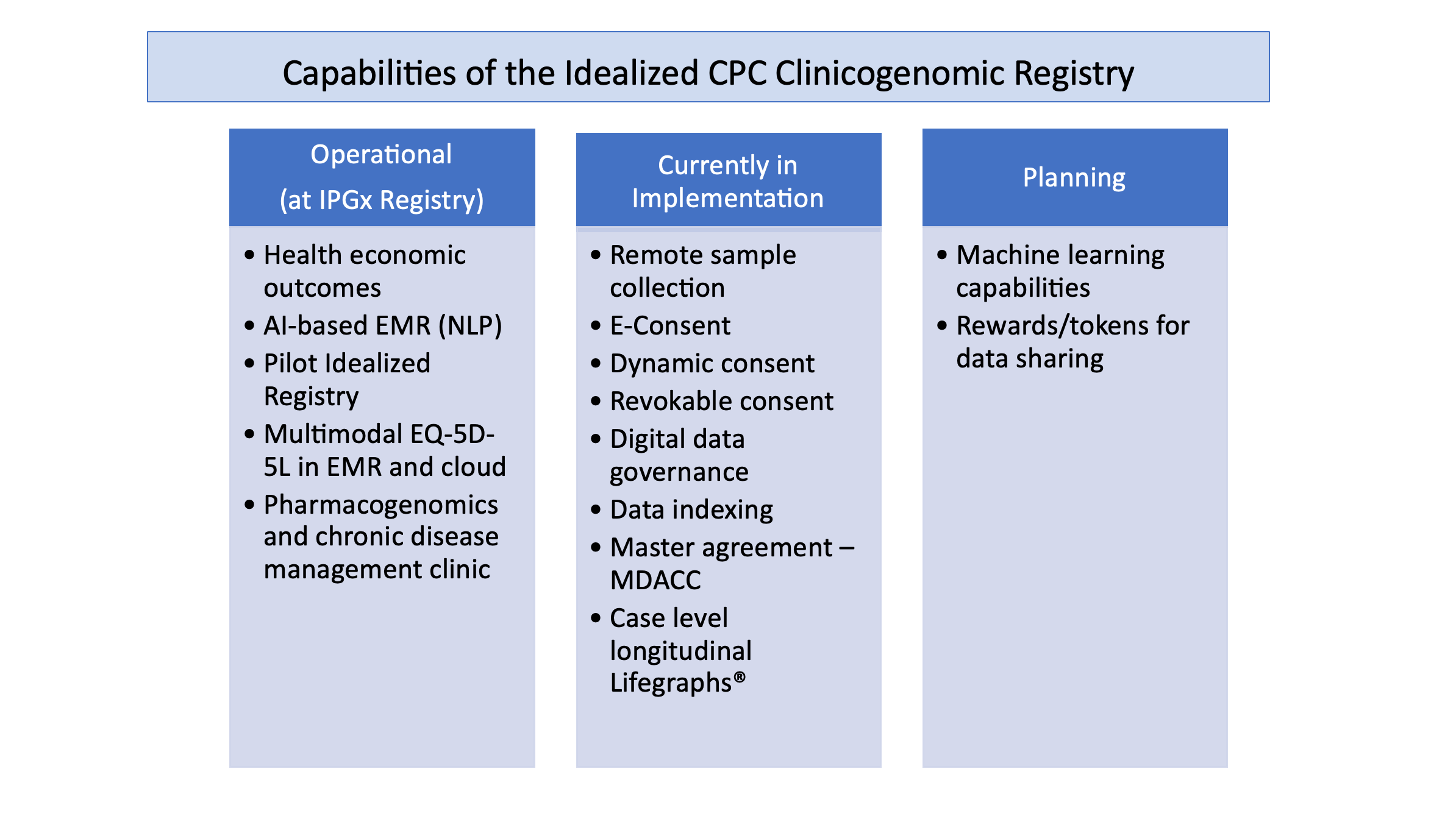
Healthy Texas
|
Healthy South Texas Medication Assistance Program
(n=3200 patients in the HT-MAP program, sample protocol in development). Healthy Texas is a Texas A&M–led program designed to address healthcare disparities among underserved Hispanic populations in 27 Texas counties (Figure 2).This program focuses on diabetes, medication assistance, nutrition, and exercise. The population enrolled in the Healthy Texas Medication Assistance Program (HT-MAP) is impoverished and includes 80 to 95% Hispanics with a high chronic disease burden and significant disparities in healthcare access.1 The range in median household income for the 27-county region ranges from $27,131 in Dimmit County to $62,000 in McMullen County 2. The population has been successfully engaged in community health and research programs for years.1, 3 Our efforts will focus on four locations where more than 60% of the participants reside: Victoria, Brooks, Kleberg, and Nueces1. This population has limited healthcare access. Thus, EMR data is limited to those patients who use FQHCs affiliated with the HT-MAP program; this function is still in development. |
Interprofessional Pharmacogenomic (IPGx) Registry
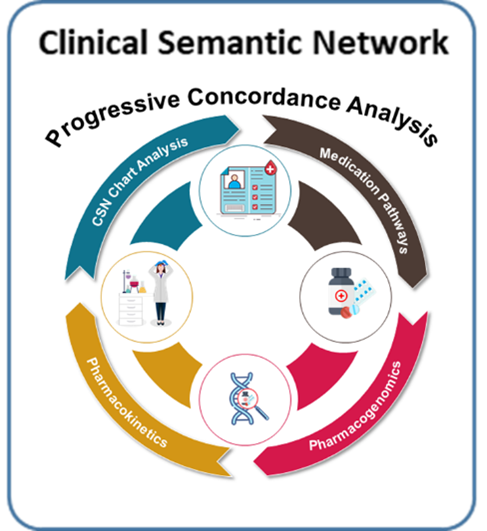 |
An informatics-driven specialty clinical practice that informs medication management decisions for primary care practices and serves as a force multiplier that augments primary care capacity to improve outcomes for complex clinical cases and underserved populations in the Brazos Valley and Coastal Bend of Texas. A parallel arm collects pharmacogenomic and clinical pharmacokinetic data through CAP/CLIA diagnostic laboratory partners for use in clinical decision support, quality improvement, and research projects by TAMU faculty in collaboration with the private sector. The clinic currently sees 6 cases per week, focusing on the >1000 polypharmacy patients in our primary care practice. Plans to scale upon grant funding for PGx testing and clinical PK tests that are not reimbursed by insurance. A pilot program, 50 patients (IRB2021-0860F) recently completed, IRB for expanded registry and biobanking program pending. The program will be expanded to integrate with behavioral health and blood pressure management aspects of Medicare wellness visits. |
| The IPGx Registry abstracts data related to adverse drug reactions, medication changes, and deprescribing to address drug-gene interactions, drug-drug-gene interactions, and phenoconversion. A drug safety program has been established in parallel to accelerate causality assessment best practices for rare, severe adverse events. |
|

